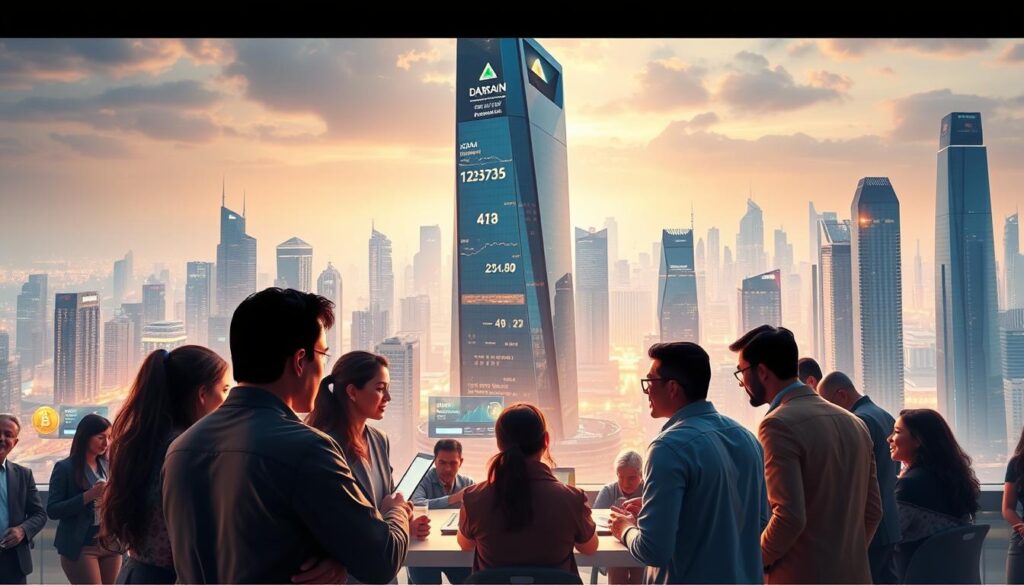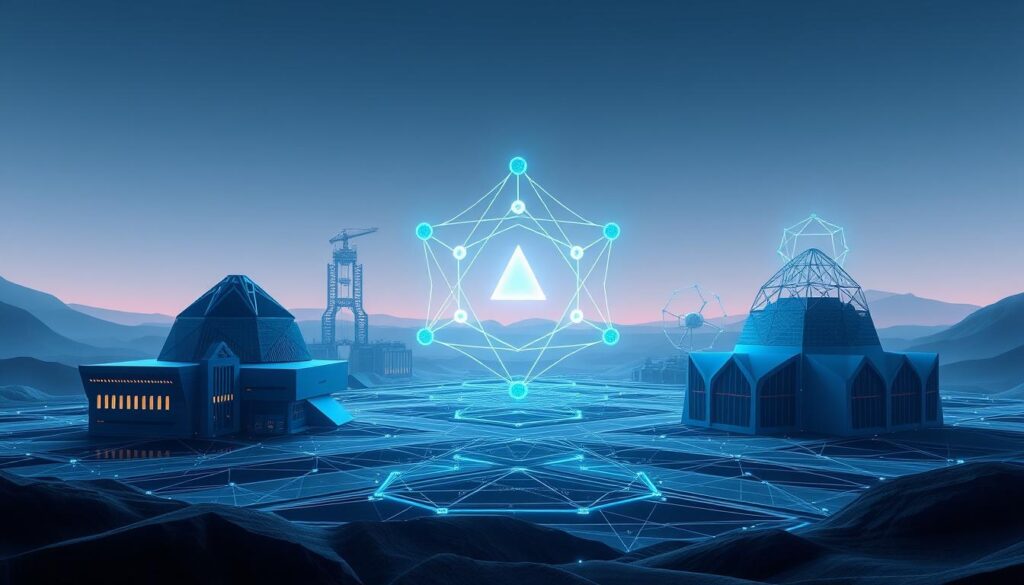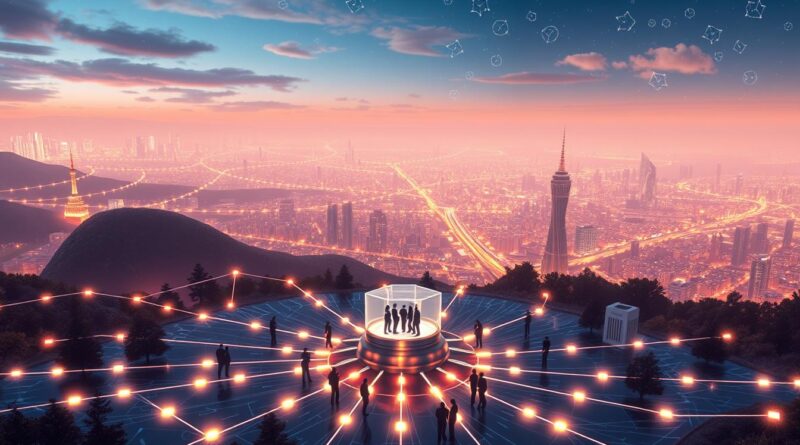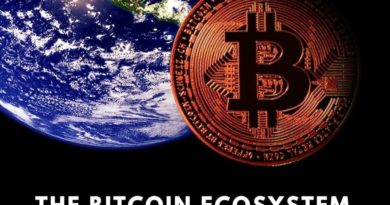Exploring the World of DAOs: Decentralized Autonomous Organizations
Decentralized Autonomous Organizations (DAOs) are changing how we work together worldwide. By 2023, DeFi protocols had over $100 billion in value, thanks to blockchain. These groups run without bosses, using smart contracts to follow rules.
DAOs are online groups where decisions are made by those who own tokens. Members vote based on how many tokens they have. All actions are recorded on blockchains, making everything open and unchangeable.
Key Takeaways
- DAOs use smart contracts to automate governance, removing centralized control.
- Members gain voting rights via tokens, enabling global participation in decision-making.
- Blockchain ensures full transparency, with all activities recorded on an immutable ledger.
- DAOs are disrupting industries from finance to real estate, opening new ways to work together.
- Despite their promise, challenges like regulatory uncertainty and security risks are yet to be solved.
The Rise of Web3 Governance Models
Blockchain governance is changing how groups make decisions. Old ways of making decisions are being replaced by new ones. Now, members vote directly, not through leaders.
This change shows a bigger move toward making decisions together. It lets the crypto community shape things without middlemen.
“DAOs operate on principles of radical transparency, contrasting with traditional organizations that often have limited transparency, leading to information asymmetry.”
Here’s how governance has evolved:
From Traditional Organizations to Decentralized Models
| Traditional Organizations | Decentralized DAOs |
|---|---|
| Centralized leadership | On-chain voting by token holders |
| Confidential meetings | Public blockchain records |
| Geographic limitations | Global participation |
The Blockchain Revolution and Organizational Change
Smart contracts make rules automatic, cutting out human error. MakerDAO uses this to manage DAI, a stablecoin without a central authority. UNI token holders vote on Uniswap changes, showing decentralized decision-making can scale.
Why DAOs Matter in the Digital Economy
DAOs let the crypto community drive innovation. Social DAOs like Friends With Benefits mix art and governance. Regen Network uses tokens to tackle climate goals.
These models bring people together through shared ownership. This reduces fights caused by central control.
- Radical transparency builds trust
- Global participation breaks geographic barriers
- Token holders directly shape outcomes
Despite risks like smart contract bugs and unclear rules, DAOs are changing how we work together. As blockchain governance grows, it shows a way to fairer, more inclusive systems.
What Are DAOs (Decentralized Autonomous Organizations)?
DAOs, or Decentralized Autonomous Organizations, are groups that run on blockchain tech. They have a DAO structure based on smart contracts, which means no top-down management. Members make decisions by voting with tokens, and rules are set by code.
These groups are open and transparent, with all actions recorded on a public blockchain. This is different from traditional companies.
Decentralized: Power is spread out among a network, not held by one person. Autonomous: Rules are followed automatically when certain conditions are met. Organizations: They work together to achieve goals, like funding projects or managing assets. DAOs are a move away from old systems to new, community-led ones.
The SEC said in 2017 that The DAO’s tokens were like unregistered securities under federal law.
Legal views on DAOs are changing. Wyoming was the first U.S. state to officially recognize DAOs in 2021. Utah followed in 2024, seeing them as LLCs. But, there are ongoing issues:
- Most voting power is held by a small group, with the top 1% controlling 90% of tokens in many DAOs.
- The 2016 DAOs hack lost $50M, leading to Ethereum’s hard fork.
- There’s a lot of uncertainty about following the law, as rules vary by place.
- Some DAOs, like Lido DAO, need a certain amount of tokens to pass proposals (5% in Lido DAO’s case).
- Voting records are clear and stored on the blockchain.
- Low voter turnout can slow down decisions.
Groups like the $3.4B Uniswap Foundation and the $1.5B Ape Foundation show DAOs can be used in many ways. They range from DeFi projects to community-driven projects.
The Technical Foundation of Decentralized Organizations
DAOs are built on three main technical parts: smart contracts, blockchain protocols, and token systems. These tools help make decisions, keep transactions safe, and make sure everyone’s interests are aligned. They do this without needing a central authority.
Smart Contracts as the Backbone of DAOs
At their heart, DAOs use smart contracts. These are programs on blockchains like Ethereum that follow rules. They handle voting, money distribution, and who’s in automatically. For example, MakerDAO changes borrowing rates for DAI based on what the community votes for.
Blockchain Technologies Powering DAOs
Blockchains differ in how they support blockchain governance:
| Blockchain | Strengths | Use Cases |
|---|---|---|
| Ethereum | Widest developer ecosystem | Complex DAOs like Uniswap |
| Solana | Fast transaction speeds | NFT and media DAOs |
| Polygon | Low-cost scaling | Small community DAOs |
Token Economics and Incentive Structures
Token holders in DAOs get to vote based on how many tokens they have. For example, Compound Finance lets token holders suggest changes to interest rates. Tokens also help fund projects, grants, or rewards to keep people involved.
On-Chain vs. Off-Chain Governance
- On-chain: Votes and decisions recorded directly on the blockchain (e.g., Snapshot voting for AAVE)
- Off-chain: Discussions occur in forums like Discord before formal votes (e.g., Moloch DAO)
DAOs use a mix of both to be open and flexible. This setup allows for things like buying art (ConstitutionDAO) or helping Ukraine (UkraineDAO). It all happens without the need for a top-down structure.
Key Benefits of Participating in DAOs

DAOs change how we participate in the crypto world. They give power to those who hold tokens. This means everyone can share their thoughts and vote on big decisions. It makes things fair and open.
- Direct Influence: Token holders get to decide on big things like how money is spent or updates to the system. This makes sure everyone’s voice is heard.
- Global Collaboration: DAOs break down barriers. People from all over can work together. For example, developers in India and investors in Canada can team up on projects like Decentraland or Gitcoin.
- Trust Through Code: Smart contracts make sure things happen as planned. This is seen in how fast Compound updates its system. And, public blockchains keep things honest by recording everything.
- Financial Incentives: Projects like MakerDAO give out tokens as rewards. This makes everyone work together towards success.
- Resilience: DAOs don’t rely on one person. This means they can keep going even when faced with challenges. For example, Colony’s system keeps working, no matter what.
| Traditional Organizations | DAOs |
|---|---|
| Centralized leadership | Decentralized decision-making |
| Restricted membership | Global participation |
| Slow bureaucratic processes | Rapid proposal execution via smart contracts |
| Funds controlled by executives | Transparent treasury management on-chain |
DAOs mix tech with teamwork. They let people help shape projects they care about. This is changing the game in areas like NFTs and open-source software.
Common Challenges and Limitations in DAO Structures
Decentralized autonomous organizations (DAOs) face many obstacles. These issues test their core principles. Technical, legal, and social barriers often slow their growth. Here are some key problems they face.
Security flaws in smart contracts and Sybil attacks threaten DAO structure integrity. The 2016 The DAO hack lost $50 million, showing major weaknesses. Today, 25% of DAOs deal with Sybil attacks, which distort decentralized voting.
A study from Chainalysis reveals less than 1% of token holders control 90% of voting power in major projects.
Regulatory uncertainty adds to these risks. Over 55% of DAOs face unclear laws worldwide. Platforms like BitShares have faced legal battles, showing the need for clear blockchain governance. Voter apathy is also a problem: 40% of voters rarely participate, and 50% of treasuries are controlled by a few.
- Technical Scaling: High Ethereum transaction fees slow decentralized voting during big proposals.
- Community Engagement: Only 1% of members really participate in governance, Aragon data shows.
- Legal Gray Areas: 35% of DAOs lack conflict resolution systems, risking splits.
| Challenge | Description | Example |
|---|---|---|
| Security Risks | Exploits targeting smart contract logic | $50M drained from The DAO in 2016 |
| Regulatory Gaps | Conflicting laws across jurisdictions | BitShares’ compliance struggles |
| Voter Apathy | Low turnout enabling plutocratic control | MakerDAO’s token concentration |
| Scalability | Decision-making slows as membership grows | Decentraland’s partnership delays |
To overcome these hurdles, DAOs need better blockchain governance systems. They also need to educate more people and get clearer global laws.
Popular Types of DAOs in Today’s Ecosystem

DAOs are changing how we work together in the crypto world. They help us innovate and make decisions in a fair way. They cover areas like finance and art, making it easier for groups to act together.
| Type | Purpose | Example | Key Fact |
|---|---|---|---|
| Investment DAOs | Pooled funding for crypto projects | MetaCartel | Awards grants up to $10,000 for Ethereum dApps |
| Protocol DAOs | Decide blockchain upgrades | MakerDAO | Uses MKR tokens to vote on collateral rates |
| Collector DAOs | Purchase high-value NFTs | ConstitutionDAO | Raised $47M ETH for a U.S. Constitution bid |
| Service DAOs | Decentralized talent networks | Krause House | Aims to purchase an NBA team via member votes |
| Social DAOs | Community-driven networks | Friends With Benefits | Requires 75 $FWB tokens for membership |
Hybrid DAOs mix old and new ways of working, like BanklessDAO. Venture DAOs, like Aave Grants DAO, support new web3 startups. Groups like Big Green DAO work with charities to help the environment. These examples show how DAOs tackle big problems while keeping everyone involved.
“BanklessDAO drives adoption of bankless money through media and education.”
Despite their many forms, DAOs face challenges. The 2016 The DAO hack lost 3.6M ETH, showing security is a big issue. But, new ideas like Balancer’s subDAOs help make DAOs better. DAOs are making it easier for us to work together, whether it’s buying NFTs or funding new projects.
Notable DAO Success Stories and Case Studies
DAOs are changing how communities work together and make decisions. They cover areas like finance and art, showing blockchain governance can make a difference. Today, over 3,800 DAOs use platforms like Aragon, each with its own approach.
Investment DAOs show how groups can manage money together. FlamingoDAO and MetaCartel Ventures use member funds for NFT and crypto investments. This makes opportunities available to more people, not just big firms. BitDAO, supported by PayPal co-founder Peter Thiel, has a $1 billion fund for Ethereum projects.
| DAO | Type | Impact |
|---|---|---|
| MakerDAO | Protocol | Stabilized DAI, a $7B+ decentralized stablecoin |
| Friends with Benefits | Social | 20,000+ members curating exclusive digital communities |
| PleasrDAO | Creator | Acquired iconic NFTs like the “World of Women” collection |
- Protocol DAOs like Uniswap let users vote on fee structures and liquidity incentives.
- Social DAOs like Bankless DAO host global meetups with 50,000+ participants.
- Creator DAOs such as Seed Club enable artists to monetize directly via tokenized memberships.
Despite issues like the 2016 $50M exploit, DAOs like MolochDAO show blockchain governance can protect important systems. These stories show DAOs are real and are changing finance, culture, and how we work together in the crypto world.
How to Join and Participate in DAOs

To join a DAO, first look for groups that interest you. As a token holder, you get to vote. The crypto community grows when more people join in. Here’s how to get started:
| Step | Action | Tools |
|---|---|---|
| 1 | Research DAOs via DeepDAO or DAO Landscape | Browser, Discord, Twitter |
| 2 | Set up a crypto wallet (MetaMask) | MetaMask, Trust Wallet |
| 3 | Acquire governance tokens | Uniswap, SushiSwap |
| 4 | Participate in decentralized voting | DAO’s voting portal |
| 5 | Join working groups for tasks | Discord channels, GitHub |
Begin by checking out DeepDAO to find DAOs that interest you. Use a crypto wallet like MetaMask to keep your tokens safe. Buy governance tokens on Uniswap to become a token holder. Then, use the DAO’s tools to vote in decentralized voting rounds.
“Community participation drives DAO success.”
Do more than just vote by joining task forces or talking on social media. Use analytics tools to see your impact. You can even move up to leadership roles. The crypto community values many skills, so show off yours. But, don’t forget to avoid mistakes like missing proposal deadlines or not networking in Discord.
The Future Landscape of Decentralized Autonomous Organizations
DAOs are changing how organizations work in many fields. Soon, blockchain could be the backbone of decision-making and infrastructure projects. Companies are now mixing old ways with new tech, making finance and supply chains more open and efficient.
New ideas are making DAOs better. Things like voting systems based on reputation and AI for fair decisions are coming. Also, new tech lets DAOs work together across the world, showing how they can grow.
- Reputation systems prioritizing contributor history over token holdings
- AI models predicting governance outcomes and mitigating risks
- Zero-knowledge proofs ensuring privacy in voting processes
DAOs might soon be part of our global systems, like carbon markets and healthcare. The future depends on keeping things safe and fair. This could lead to organizations that are not just good at what they do, but also fair and open to everyone.
Conclusion: Are DAOs the Future of Organizational Structure?
Decentralized Autonomous Organizations (DAOs) are at a crossroads. They use blockchain to make decisions automatically, allowing people to work together without borders. Over 70% of DAOs run on Ethereum, managing $6 billion in assets. But their path forward is filled with both promise and challenges.
DAOs break down old power structures, letting everyone vote with tokens. MakerDAO and Gitcoin show how this works. But, they face risks like the 2016 DAO hack, which lost $50 million. Low voter turnout and unclear laws also make things tough.
Despite these obstacles, DAOs open up new ways to organize. They could mix old and new structures together. New ideas like quadratic voting and cross-chain governance aim to get more people involved. Uniswap and Aave show DAOs can create huge value.
DAOs are not a complete solution yet. But they’re changing how we work together. Their impact on making things more open and decentralized is here to stay.




